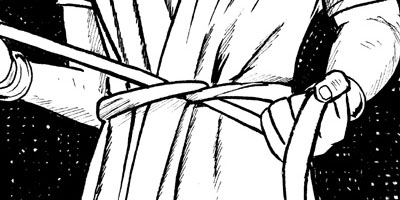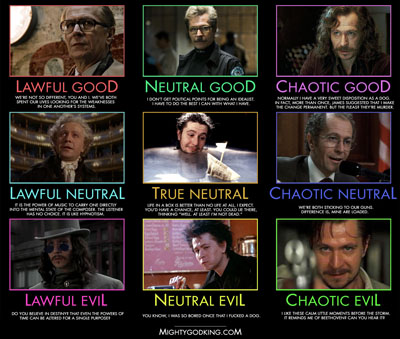![VERONICA: [CLIFFHANGER reference] / ARCHIE: [VERTICAL LIMIT reference]](/images/archclimb.jpg)
22
Aug
![VERONICA: [CLIFFHANGER reference] / ARCHIE: [VERTICAL LIMIT reference]](/images/archclimb.jpg)
21
Aug
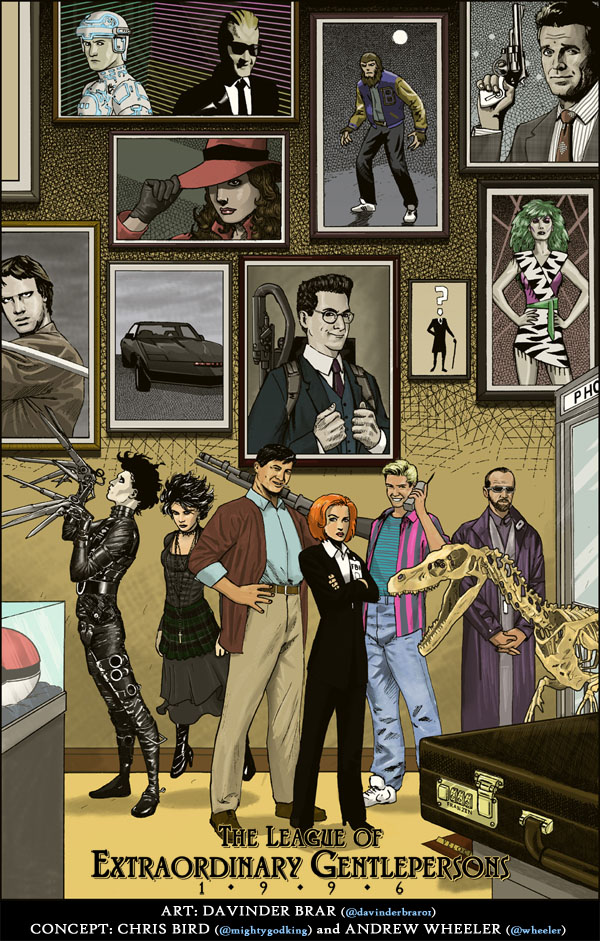
Abuse of Playback, the technologically-derived drug made from distilled human memories, is sweeping the world – and Special Agent Fox Mulder learned too late that Playback was put forth on this planet by the Purity, seeking to condition humanity to their rule so as to better combat the Deadite incursion threatening the aliens’ homeworld. Now Mulder is missing, and it falls to his partner, Dana Scully, to re-activate secret protocol LXG-71, the “League of Extraordinary Gentlepersons” (protocol renamed 1993 for “sensitivity reasons”).
Scully swiftly collects Hong Kong Detective-Inspector “Tequila” Yuen, hyperviolent Wiccan practitioner Nancy Downs, the biological experiment/walking weapon known only as “Edward,” and a young high-functioning sociopath named Zack Morris who has the strange ability to stop the flow of time itself. Perhaps it is this last who attracts the attention of an enigmatic man who answers only to “Rufus,” and who asks Scully to “set history right” and see that two young musicians – that, so far as she can tell, never existed – be born anew, so that peace may flourish on Earth. But the Purity have never shown any signs of temporal travel capability… so who, then, altered history?
If you’re interested in checking out other work Davinder and I have done together, you can start with Al’Rashad or, alternately, our “Introduction” strip for Brainiac Five.
For those interested in obtaining a print of this fine piece of artwork, go here.
And of course, all due props to Sims and Shackles.
20
Aug
My weekly TV column is up at Torontoist.
20
Aug
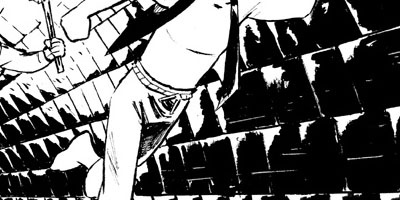
And, as you may or may not have noticed, we have now brought Al’Rashad up to date with late-90s webcomic technology.
17
Aug
Obviously, Ayn Rand has been in the news a lot lately. Not because she’s done anything particularly newsworthy herself, of course, but because the new Republican pick for VP has frequently and publicly expressed his admiration of her before being told that loudly talking about how awesome a self-professed atheist is just doesn’t fly in a party that panders almost exclusively to fundamentalist Christians these days. So he made a public repudiation of his love of Ayn Rand’s thirty-year old corpse, while still of course admiring all of the bits of his philosophy that let him be a selfish prick. (Um, this is as good a time as any to mention that yes, this is going to be a post with Views. You may wish to skip it if you love Republicans, Objectivism, or being a selfish prick.)
And whenever Ayn Rand’s name comes up, I always think of Philip K. Dick. Not because the two of them were buddies or anything. I don’t even think they knew each other. Mainly because I read a very interesting book called ‘Counterfeit Worlds: Philip K. Dick On Film’, which covers a lot of his life and writing in the process of explaining why his films are so attractive to screenwriters. The section that talked about ‘Do Androids Dream of Electric Sheep?’, the novel that eventually became the film ‘Blade Runner’, explained that its genesis came from Dick’s thoughts on World War II and the Holocaust. He genuinely believed that no real human being could do that kind of thing…that while the Nazis might have looked human and sounded human, some fundamental human quality was missing from them that allowed them to perpetuate the atrocities they did. He envisioned a test that would separate the real humans from the fake humans, a psychological evaluation that would separate out those who possessed empathy for others from those who didn’t. This eventually went on to become the Voight-Kampff test, which could sniff out androids mimicking humanity through their inability to care about others.
Which is an interesting idea for a novel, of course, but I never really felt like Dick took it far enough. In the first place, I think his original notion–that people who lack empathy and do terrible things to other people are somehow “not human”–is really more of a convenient dodge than anything else. As much as I might wish it otherwise, Ayn Rand is part of the same species as I am, and is my kith and kin, even though she would fail the Voight-Kampff test. (“You see a turtle by the side of the road, lying on its back.” “The turtle is a leech and a parasite. If it can’t turn itself over, I’m doing the world no favors by allowing it to continue surviving. It will only consume food that should go to better, fitter animals like me.”) She’s a woman who notoriously idolized a sociopathic serial killer, and whose philosophy can best be summed up as “Altruism doesn’t exist. Anyone practicing it is a sucker, and anyone benefiting from it is a leech.” (Which didn’t stop her from collecting Medicare, of course.) Paul Ryan has bought fully into the idea that selfishness is a virtue and kindness a vice, and he’s far from the only one. To pretend that these people are somehow inhuman is to avoid confronting the painful and ugly truth about humanity: Decency is a skill we learn, not a quality we inherit.
And the most complex part of all is that it’s not a skill we ever truly master…and Dick is the prime example. His story that started with the envisioning of a test for empathy is, at its heart, about how it’s morally acceptable to kill people who lack empathy because they’re not really people. They’re things, and you can do whatever you want to things without feeling bad. (Sure, they’re androids, not people. And the Klingons weren’t the Soviets.) Fundamentally, Dick is engaging in one of the most classic ways of avoiding one’s conscience and shutting down empathy, by “otherizing” the people you hate instead of understanding them, while claiming that his purge is a pro-empathy action. He deludes himself into thinking that a man can “retire” androids who look like people, talk like people, act like people all day every day for years…and it won’t cost him any of his soul.
‘Blade Runner’, the film made out of Dick’s novel, at least understands how false that is. Deckard in the film is a burnt-out wreck of a man because his empathy withered and died years ago, not because he’s secretly an android himself. The Voight-Kampff test separates out human beings with empathy from the androids…the androids that live a life of slavery from beginning to all-too-sudden end, exiled into space to do the jobs that humans won’t do. And when they try to escape? We kill them…excuse me. We “retire” them. Because if we call it “retiring” them, we don’t have to think about what we’re doing. We don’t have to understand their fear and pain and anger. In short, we don’t have to empathize with them because we passed the empathy test.
‘Blade Runner’ avoids that paradox for too much of its running length, which is why I would like to see someone else take a crack at it. It’s a drama about slavery where nobody ever suggests that slavery is a bad thing, which is a bit too bloodless for a movie with such an angry contradiction right at its very core. The only time we see even a hint of it is when Roy Batty rescues Deckard at the end, an act that gives the lie to the entire notion that androids are incapable of empathy and forces Deckard to confront the truth: He’s a mass murderer, and he never even thought about it. And given that he gets maybe two lines of dialogue after that, I’d call the film at least a little bit flawed. A sequel that really got into the idea, one that confronted the notions that androids could learn how to be human beings…and that human beings can all too easily forget…could be even better than its predecessor.
16
Aug
Christian: Let’s assume DC’s movie efforts and Justice League series continues to hit snag after snag (likely), and by some cosmic twisting of events it all gets dropped in your lap. You’re given the mandate to reboot their efforts marvel style, but with one catch. Their needs to be a villain behind all of the plots in the various movies, but not one of the biggies everyone knows (no Lex Luthor or Brainiac for you). You’re mandated to take some low-level DC villain, and realistically ramp him up to being a threat for the big team. Who is your guy in that scenario?
I already cast my vote for Starro last week. If I need a second choice: Per Degaton. (Who, incidentally, was someone I always wanted to go up against the Legion of Super-Heroes, but never mind that.) Degaton easily translates to movies because he’s just a normal dude who happens to be a time-traveling tyrant, which gives you a lot of license to do awesome stuff and gives him an excuse to be anywhere doing anything, because of causality requiring him to be there at that point.
Also, the costume redesign he got in Johns’ JSA is really cool and would translate to real-life costuming very well.
Andrew Miller: If you could make one improvement to transit in Toronto, what would it be?
A downtown relief subway line in the east. The greatest operational stress point for the TTC is its heavy use along the Yonge line – another north-south line intersecting with the Sheppard line, Bloor/Danforth line and terminating at, say, Union would vastly expand TTC subwya coverage with only a few new stations and make the Yonge line far more rideable.
After that, in order: light rail transit along Finch, extending the Sheppard line to Downsview, light rail along Eglinton.
Pantsless Pete: Captain Marvel was a better character and comic than Superman and if not for his destruction via lawsuit his dominant market postion would have meant we ended with better comics today: Discuss.
I like Captain Marvel (not “Shazam,” – Jeebus, DC, what the hell is wrong with you). But a better character than Superman? The dude is a G-rated Superman clone, no ifs ands or buts about it; yes, he makes the child’s power fantasy more explicit, I suppose, and certainly Superman does not have a talking tiger buddy (memo to DC: have Superman be friends with a talking animal of some kind. Or, alternately, Rex the Wonder Dog), but this is all icing on the cake rather than the actual cake, and Superman is the real deal. Really, this isn’t even a contest.
Rbx5: Which, if any, of the upcoming post-AvX Marvel books/creative teams are you anticipating?
I honestly don’t even bother with previews any more, really. I don’t have the energy, so everything comes as a large surprise unless it is too gigantic to avoid the hype (like AvX) or somebody mentions it to me in email or sends me a link to a ComicsAlliance article (like Hawkeye – which was fine, but Abhay Khosla nailed it when he pointed out the giant stylistic debt owed to Batman: Year One on that comic).
Really, it makes comics a little more enjoyable: everything is a pleasant surprise, because these days I expect things to be mediocre rather than good.
PaulW: Hogan’s Heroes but played straight.
The BBC already did this thirty-five years ago with Colditz. It’s certainly aged a fair amount, but it’s not bad.
Jack Pumpkinhead: How do you feel about Final Fantasy games? Ever played any, favorite game, etc?
I played FF Tactics, and then 7 through, and half of 8, and then I more or less quit. I’m mostly a PC gamer, and the Final Fantasy games are console games, and once I stopped consoling (which was about the time my original Playstation started gathering dust) Final Fantasy and I walked our separate paths, especially after fans of the series started getting weird about whatsername in 7. FFT is still one of my favorite games of all time, though, and I’d love to see/know about a decent PC port/homage of that game.
Also, there were not enough hats in it. Good games have hats.
15
Aug
Watch this compilation of finishing moves from All-Japan Pro Wrestling in the early-to-mid-1990s without wincing at least once and you will impress me:
What’s interesting about this to me is that All-Japan’s death rate (and it is sad to say that death rate in wrestling is something that can be quantified) is so low. There’s only one guy in this video who directly died as a result of wrestling, Mitsuhara Misawa (green and white trunks). [EDIT: In comments, Rev rightly points out that Gary Albright died of a heart attack mid-match in 2000, so: two, not one.] Terry Gordy died of a blood clot, Doug Furnas of complications from Parkinson’s and Steve “Dr. Death” Williams from throat cancer, but none of those can really be blamed on their wrestling careers. All of the rest of the people in this video are still quite alive and in many cases are still actively wrestling, and this is video from almost twenty years ago where every other move looks like they’re actively trying to break the other guy’s neck. This, I think, speaks very well of Japanese wrestling’s training culture.
Splotter Spellen is, in many ways, the boardgame equivalent of a supercar manufacturer like Pagani; it’s a small company that makes expensive, small-print run boardgames that, ruleswise, are of extremely high quality, and which have lovely components, but which are also geared towards serious, high-end users. Many of them are now permanently out of print and all are relatively difficult to find.
I happen to own four. (I have not, however, had a chance to play Roads and Boats yet, but it looks awesome because you get to draw on the board a la Empire Builder. Still, no play means I will save it for another post sometime.)

Indonesia is the easiest of the four to obtain; it is still in print (as it is arguably Splotter’s most popular game). Indonesia is a robust economic game with a lot of tweaks to it. The basic gameplay is simple: acquire companies, merge them for money, buy and sell goods for more money, and then research ways to make everything you do more efficient so you end the game with, surprise surprise, the most money. Unlike some economic games, however, there are so many variant tracks to make money with no clearly superior choice that the strategies become remarkably free-form. (One reason for this is that Indonesia offers each player the same number of “upgrades” to the various parts of the game, but there are so many upgrade options that nobody can upgrade everything, which means your choices of upgrade become a function of your playstyle and part of your overall strategy. This sort of dynamic is key to the design of most Splotter games.)
I won one game by dominating shipping lanes (and therefore earning money whenever anybody else sold goods); in another I saw another player corner the market on rice and meat and then merge them to corner the TV dinner market (yes, there is a TV dinner market in this game) and use the TV dinners to expand those cities that were placed to best advantage him, because only “his” cities had access to that crucial extra good, which meant those cities generated even more profit for him; in a third another player won with a combination of smartly placed shipping companies and oil production so that he was generating pure profit off his oil deliveries. Indonesia is a game with a lot of room to mentally maneuver, and it rewards deep play.
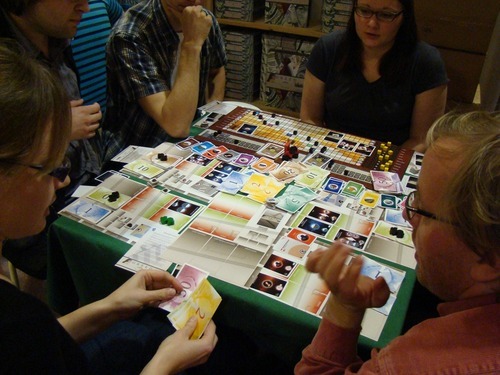
Greed Incorporated is an even more free-form economic game than Indonesia is, but it is the exact opposite sort of game from Indonesia. GI owes more to the Sackson classic I’m The Boss than your traditional hardcore economic game. Yes, there are companies producing goods and the primary way those companies make money is by selling those goods – but that’s not really the main game in GI. No: GI is meant to be a game simulation of pump-and-dump economics. You play the executive class, and you personally start the game with zero money: the way you get money is by forcing the companies you manage to fire you, at which point you collect a juicy golden parachute directly from the company’s profits. This means that all of the dealmaking and negotiation in Greed Incorporated becomes recognizing how to get ahead and create those situations where you will massively profit from a company’s impending bankruptcy. When you control more than one company, the dealmaking gets more and more intricate as you manipulate multiple companies to create massive, massive profits and then create downswings the very next year. Meanwhile, however, at the same time it becomes massively important that you be situated in multiple companies so that when these situations occur for other people, you can either profit from them or set yourself up to take over that company so you can profit even more greatly.
Meanwhile, as all of this is happening, the game also has a stock market to represent the values of the various goods you can produce, manufacture and sell – and the game is designed expressly to create bubbles in all of the goods and then pop them like whoa. Oh, and in order to win the game, it’s not simply about having the most money, because really, this is a game where you routinely end the game with over a billion dollars. No, the way to win the game is to use your money to buy the best toys, because GI is a game that recognizes that the only people that rich people envy are other rich people who have better stuff than them. Which means you bid against other players to buy the best toys (private jets, personal islands, trophy wives, et cetera) – but since whenever a toy gets bought, the next toy (which will be an even better toy in terms of winning the game) has as its opening price whatever the previous toy sold for. Which means that a lot of the battle for the best toys is about making other people overpay for a toy and then immediately buying a better one at the same price.
It’s a hilarious game, but unlike a lot of funny games, it’s a funny game that you can play completely straight because while it’s funny, it’s not “Munchkin funny” (i.e., not funny); the hilarity comes as you do horrible things to make money.

Finally, the most expensive Splotter Spellen game I own is Antiquity. An aside: people have often asked me why I hate Agricola. The answer is multiple: I hate Agricola because it’s largely a non-interactive game where you are primarily concerned with your own board, and I hate Agricola because although it offers the promise of variability (through the different worker/job cards) in truth it really doesn’t because Agricola’s scoring system is set up so that everybody is ultimately pursuing the same set of goals, and I hate Agricola because it pretends to be this brutal punishing game but it never follows through on that, and I hate Agricola because it is about fucking farming.
Dave Lartigue, when I mentioned playing Antiquity on Twitter, responded by saying “Antiquity is the game Agricola players think they’re playing.” Which is more or less accurate, I think. Antiquity is somewhere in between being a civ-game and a farming game, and the core of it feels like Agricola in that you are desperately trying to manage your resources and expand to win the game.
Except that:
1.) Antiquity forces you to think about sustainability. The game has a famine mechanic, which forces you to have more food every turn in order to avoid placing graves in your city (and graves are bad, because they take up space for your improvements and then start deactivating your improvements), but in order to get more workers or increase your territory around the city or even start a farm, you need to spend food to do so. The game also has a mechanic it calls “pollution” – when you harvest a resources outside of your city, you place pollution markers there to show that you have taken everything of value from that hex. On top of that, you have to place additional pollution counters within your “zone of control” outside your city every turn to represent the garbage and shit your city produces every turn. If you can’t place those counters? More graves! If you can’t place graves? You lose the game immediately. This tense race against the game’s clocks starts on turn one, and right from that point you constantly feel the famine and pollution breathing down your neck as you try to simultaneously expand and avoid collapse.
2.) Antiquity is much more interactive than Agricola. The game takes place on a single map; this means everybody is expanding into the same central territory and trying to claim resources as quickly as possible. It also means that expanding your territory to cross into other player’s territory becomes a vital aggressive tactic because now you can dump pollution into your opponent’s territory. One of the buildings allows you to trade resources either with the game (as per Settlers of Catan) or with other players, and since not everybody bothers to build this building, building it and operating it can effectively turn you into a bank for the other players.
and 3.) Antiquity forces you to choose your own victory condition. When you build a cathedral, you get to pick one of five patron saints to whom you will dedicate said cathedral. The saint you choose will give you a special power and determine how you will win the game. Since you typically don’t build the cathedral until a third of the game is over, this means you can alternately immediately begin building towards your first choice of win condition or pivot to a different one as need be. You can pick a deeply interactive win condition (completely surrounding one opponent with your own buildings in the countryside) or a totally isolationist one (build every city building in the game). Antiquity, unlike Agricola, lets you choose your playstyle and play to your strengths – if you can prevent your opponents from taking advantage of your weaknesses.
13
Aug
At some point I may regret not watching Grimm but I kinda doubt it
Posted by MGK Published in The Internets, TVMy weekly TV column is up at Torontoist.
13
Aug
10
Aug
When Do You Give Up On A Creator?
Posted by John Seavey Published in My Readers Got Comments, WriteringThe other day, I sold all of my ‘Sin City’ trade paperbacks.
I didn’t do it as a grand gesture or anything; I was making one of my occasional trawls through my bookshelves, clearing out the stuff that I didn’t think I’d miss and selling it to Half Price Books. But it struck me as significant that when I looked at a series I’d once greatly enjoyed, all I could think of was how much of a gigantic douchebag Frank Miller was, and how badly his desperate “misogyny and machismo” act made him equally worthy of pity and contempt. (And also that he hadn’t done anything worth reading in years…it’s hard for me to pick up ‘The Dark Knight Returns’, knowing that it inevitably led to ‘The Dark Knight Strikes Back’.) And so I sold them.
Now, this isn’t a grand announcement of how I’m done waiting for Frank Miller’s work to be good again, the way I just did with Marvel and DC. It’s not intended to be a statement of moral superiority: “Why are you still following Frank Miller, don’t you know that you’re giving money to a man who kills puppies and hates freedom and loves ‘Toddlers and Tiaras’ and…” (Et cetera.) It’s just that it struck me that everyone has that breaking point, even if it’s different for each person and different things trigger it. Everyone has that point where they can no longer separate the art from the artist, and they just can’t keep following a person’s work because as talented as they are, that person is a thundering asshole. Dave Sim hit that point for me, Orson Scott Card did too, and as mentioned, Frank Miller finally reached that level as well.
(And let me stress, this is different from suddenly realizing that someone’s actually horrifically untalented and that everything you thought you liked from them was really just superficially entertaining in a glossy way that covered up its huge, fundamental flaws. That’s what we call a “Mark Millar” moment.)
But I was interested in finding out what makes it happen for other people. Is it politics? Is it a series of particularly personally offensive works? Is it just ugly personal practices, like finding out that someone ripped off their business partners to get all the proceeds from an AMC TV series? (Not that I really care about it…I wasn’t following Robert Kirkman even before that…but it strikes me as something that might turn some people away from his work as well.) Is it gradual, or sudden? I’d like this to be as open and friendly a discussion as possible, so try to avoid saying things like, “I can’t believe you haven’t given up on (Orson Scott Card, Frank Miller, Dave Sim) yet, don’t you realize how terrible he is?” Or, for that matter, “How dare you slag off on (Orson Scott Card, Frank Miller, Dave Sim), don’t you realize he’s really a wonderful person who’s absolutely right about women being black voids of emotion that swallow men’s divine light of reason?” Let’s try to keep it to what makes that moment happen, and how you handle it when it does.
8
Aug
Easy Improvers, Raging Archies
Posted by MGK Published in Archie (Improved Or Otherwise), Comics, Interactive Fun Time Party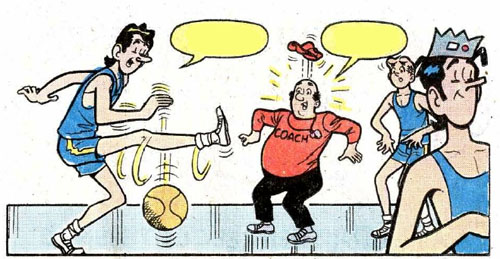
7
Aug
ALIGNMENT CHART! Gary Oldman
Posted by MGK Published in D&D Explains Everything, Flicks, Photoshopp'd6
Aug
finally Olympics are nearly over and we can watch proper TV like Honey Boo Boo
Posted by MGK Published in The Internets, TVMy weekly TV column is up at Torontoist.
And I strongly advise you watch that Honey Boo Boo trailer. If only to know the future. The horrible, horrible future.
Search
"[O]ne of the funniest bloggers on the planet... I only wish he updated more."
-- Popcrunch.com
"By MightyGodKing, we mean sexiest blog in western civilization."
-- Jenn
Contact
MGKontributors
The Big Board
MGKlassics

Blogroll
- ‘Aqoul
- 4th Letter
- Andrew Wheeler
- Balloon Juice
- Basic Instructions
- Blog@Newsarama
- Cat and Girl
- Chris Butcher
- Colby File
- Comics Should Be Good!
- Creekside
- Dave’s Long Box
- Dead Things On Sticks
- Digby
- Enjoy Every Sandwich
- Ezra Klein
- Fafblog
- Galloping Beaver
- Garth Turner
- House To Astonish
- Howling Curmudgeons
- James Berardinelli
- John Seavey
- Journalista
- Kash Mansori
- Ken Levine
- Kevin Church
- Kevin Drum
- Kung Fu Monkey
- Lawyers, Guns and Money
- Leonard Pierce
- Letterboxd – Christopher Bird - Letterboxd – Christopher Bird
- Little Dee
- Mark Kleiman
- Marmaduke Explained
- My Blahg
- Nobody Scores!
- Norman Wilner
- Nunc Scio
- Obsidian Wings
- Occasional Superheroine
- Pajiba!
- Paul Wells
- Penny Arcade
- Perry Bible Fellowship
- Plastikgyrl
- POGGE
- Progressive Ruin
- sayitwithpie
- scans_daily
- Scary-Go-Round
- Scott Tribe
- Tangible.ca
- The Big Picture
- The Bloggess
- The Comics Reporter
- The Cunning Realist
- The ISB
- The Non-Adventures of Wonderella
- The Savage Critics
- The Superest
- The X-Axis
- Torontoist.com
- Very Good Taste
- We The Robots
- XKCD
- Yirmumah!
Donate
Archives
- August 2023
- May 2022
- January 2022
- May 2021
- January 2021
- December 2020
- October 2020
- June 2020
- March 2020
- January 2020
- December 2019
- October 2019
- February 2019
- January 2019
- December 2018
- April 2018
- March 2018
- February 2018
- January 2018
- December 2017
- November 2017
- October 2017
- February 2017
- January 2017
- December 2016
- November 2016
- October 2016
- September 2016
- August 2016
- July 2016
- June 2016
- May 2016
- April 2016
- March 2016
- February 2016
- January 2016
- December 2015
- November 2015
- October 2015
- September 2015
- August 2015
- July 2015
- June 2015
- May 2015
- April 2015
- March 2015
- February 2015
- January 2015
- December 2014
- November 2014
- October 2014
- September 2014
- August 2014
- July 2014
- June 2014
- May 2014
- April 2014
- March 2014
- February 2014
- January 2014
- December 2013
- November 2013
- October 2013
- September 2013
- August 2013
- July 2013
- June 2013
- May 2013
- April 2013
- March 2013
- February 2013
- January 2013
- December 2012
- November 2012
- October 2012
- September 2012
- August 2012
- July 2012
- June 2012
- May 2012
- April 2012
- March 2012
- February 2012
- January 2012
- December 2011
- November 2011
- October 2011
- September 2011
- August 2011
- July 2011
- June 2011
- May 2011
- April 2011
- March 2011
- February 2011
- January 2011
- December 2010
- November 2010
- October 2010
- September 2010
- August 2010
- July 2010
- June 2010
- May 2010
- April 2010
- March 2010
- February 2010
- January 2010
- December 2009
- November 2009
- October 2009
- September 2009
- August 2009
- July 2009
- June 2009
- May 2009
- April 2009
- March 2009
- February 2009
- January 2009
- December 2008
- November 2008
- October 2008
- September 2008
- August 2008
- July 2008
- June 2008
- May 2008
- April 2008
- March 2008
- February 2008
- January 2008
- December 2007
- November 2007
- October 2007
- September 2007
- August 2007
- July 2007
- February 2007
Tweet Machine
- No Tweets Available
Recent Posts
- Server maintenance for https
- CALL FOR VOTES: the 2021 rec.sport.pro-wrestling Awards
- CALL FOR NOMINATIONS: The 2021 rec.sport.pro-wrestling Awards (the Theszies)
- The 2020 RSPW Awards – RESULTS
- CALL FOR VOTES: the 2020 Theszies (rec.sport.pro-wrestling Awards)
- CALL FOR NOMINATIONS: The 2020 Theszies (rec.sport.pro-wrestling awards)
- given today’s news
- If you can Schumacher it there you can Schumacher it anywhere
- The 2019 RSPW Awards – RESULTS
- CALL FOR VOTES – The 2019 RSPW Awards (The Theszies)
Recent Comments
- Harley in Thursday WHO'S WHO: Tim Trench
- George Leonard in When Pogo Met Simple J. Malarkey
- Blob in How Jason Todd Went Wrong A Second Time
- Cindi Chesser in Thursday WHO'S WHO: The War Wheel
- Scott Hater in Bing, Bang, Bing, Fuck Off
- dan loz in Hey, remember how we talked a while a back about b…
- Sean in Server maintenance for https
- Ethan in CALL FOR VOTES: the 2021 rec.sport.pro-wrestling A…
- wyrmsine in ALIGNMENT CHART! Search Engines
- Jeff in CALL FOR VOTES: the 2021 rec.sport.pro-wrestling A…
